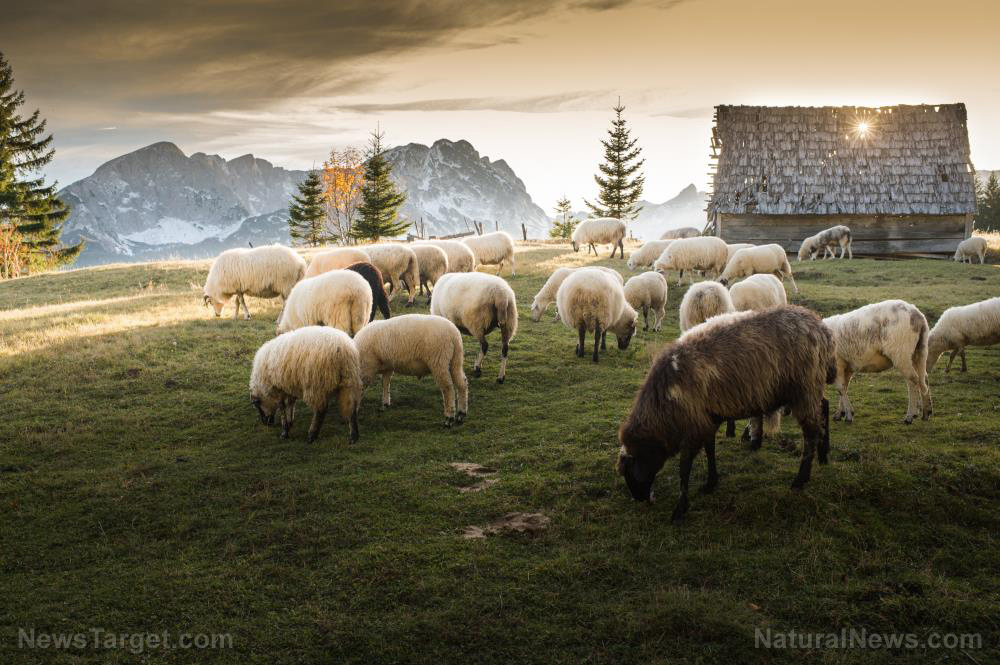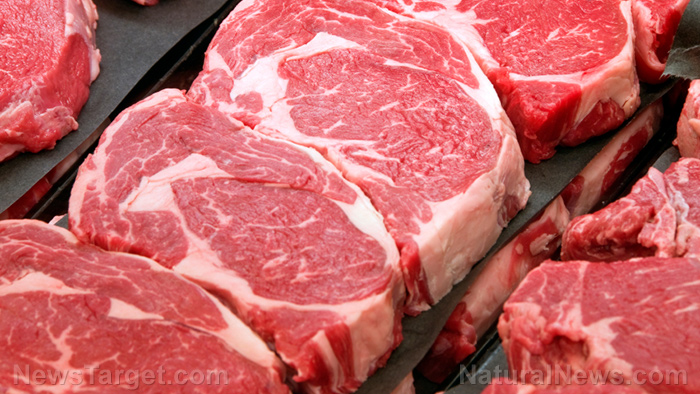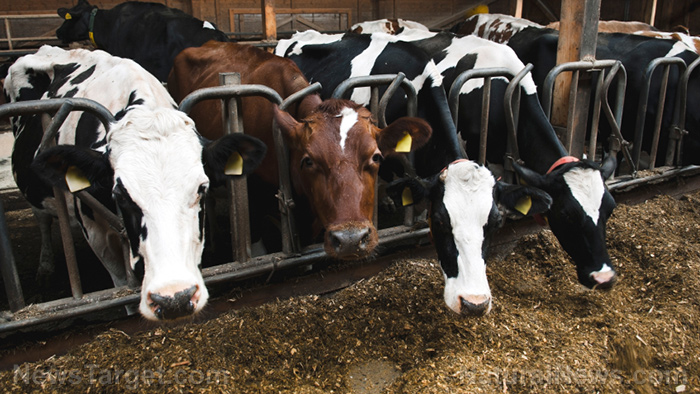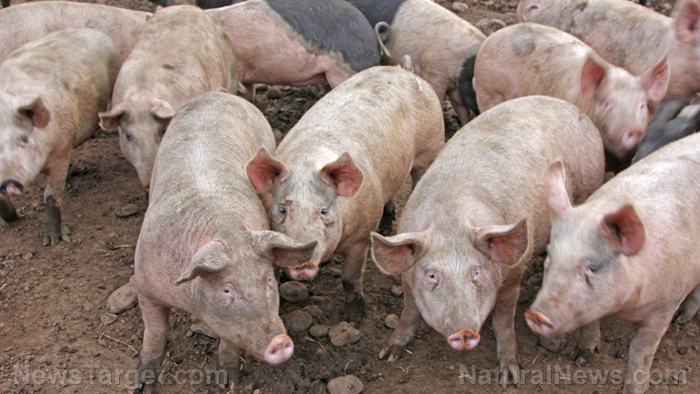
If you want to become self-reliant or try a new hobby, you can look into raising animals on your property for meat or dairy. (h/t to Survivopedia.com)
While chickens are the first choice for many homesteaders, animal husbandry goes beyond chickens. Here are some animals that you can raise on your homestead for food:
Grazing animals
When deciding between grazing animals, you can keep either a cow or sheep. What you choose will depend on what you need the animal for.
If you want milk, get some sheep. Sheep will also produce wool that you can use to make your own clothes, which you can also use for textile production as a source of income.
Keep in mind that if you get a lot of sheep, you will have to make sure that you have enough space to accommodate all the grazing animals.
You can also get lamb or mutton from sheep, but not everyone will like the taste of mutton. If you don't like mutton, it might be better to raise cows since they will produce more meat.
Depending on the breed, your cows can also be a source of both milk and meat.
If you have a small homestead, one or two grazing animals may be enough for your family. However, if you want to raise livestock for profit, you will need more space for your animals.
Cows
Cows are the best choice for your homestead if your goal is to have a source of food. Before buying a cow, do your research to decide which breed is best for your budget, meat preference and location.
The most popular beef cattle are Angus, Hereford and Texas Longhorn.
If money is an issue, the number of cows you keep will impact your homesteading budget since feed costs will go up, depending on the number of animals you have. Cows will also need enough pasture. (Related: Chickens, cows and more: Things to consider before choosing livestock for your homestead.)
Sheep
Get sheep as starters or training animals since their feed costs and maintenance are pretty low.
Unlike cattle, sheep don't require heavy-duty fencing and this helps significantly reduce your costs. Sheep also don't require feeders or waterers as they can survive on grass alone.
Sheep are prey animals and they tend to live in social communities to provide extra security and protection from predators. Sheep live in a group called a flock and if one is separated from its flock, it can become anxious, nervous and depressed since it will feel vulnerable to danger.
Give your sheep peace of mind by always trying to keep it with other sheep or at least other livestock animals like goats.
If you are going to purchase sheep, plan on purchasing several to provide a flock environment. Ideally, your flock should have at least four to five sheep to provide a secure flock setting.
One downside to keeping sheep is they are more susceptible to parasites and worms compared to cattle. An infestation could do real damage to sheep before you can control it.
Ducks
Ducks are also great layers. Like chickens, ducks are all-around birds that will provide you with meat and eggs.
If you're not sure what breed to get, look up Muscovy ducks. Technically not a duck, Muscovy ducks have geese descendants.
These ducks haven't been hybridized and are wilder than the average duck, but this makes them more self-reliant. They are great foragers, but they may take to the sky if you don't clip their wings.
A Muscovy duck can grow up to 15 pounds and provide double the meat of an ordinary duck. They are not as productive as chickens, but the eggs ducks lay are more nutritious.
Goats
A miniature dairy goat is a great choice for many homestead beginners since they are low maintenance and provide milk.
Miniature dairy goats are obtained by breeding Nigerian dwarf goats with purebred American goats. There are many breeds to choose from, but the Nigerian Dwarf breed is ideal for newbies.
You will need a buck and a doe since the does will produce milk to feed their young. They will lactate for up to eight months after giving birth, and they don't mind sharing their milk.
Nigerian dwarf goats are an all-around breed and they are highly productive even though they are small. Each doe will produce at least two quarts of milk per day.
With one buck and two does, you will get more kids as the does give birth. If you want to limit the breeding, separate the buck from the does. When the buck is isolated, it will get depressed, stop eating and may even die, so a separate pen nearby is often best.
You can keep the goats together if you have a wether (castrated buck). Wethers are less aggressive, are less prone to separation anxiety and they live longer. Wethers can keep either the does or bucks company, and can be used for meat.
Pigs
If you want to raise pigs, keep in mind that they are harder to raise than other animals.
Make your life easier by getting Kunekune pigs, which originate from New Zealand. These medium-sized pigs have a more pleasant temperament compared to American pigs.
Kunekune pigs are fat and round. The females grow between 100 and 180 pounds and the males grow between 200 and 250 pounds.
These pigs have short snouts and they won’t challenge fences.
Kunekune pigs are grass-based and they love to forage for food. They don't depend on grains like other breeds, and if you have a pasture for the cows or sheep, Kunekune pigs are an ideal choice.
Rabbit
Meat rabbits are an ideal choice for a small homestead since they don't require much space if they are housed in cages or hutches.
They also cohabitate well with other animals, especially fowl, so you can build a large chicken or duck coop and house both your chickens and rabbits in it.
A rabbit farm can be highly productive because rabbits breed a lot and they provide ample meat. Should you end up with too many bunnies, you can sell the offspring to earn some money.
If you also have a home garden, use rabbit poop as a natural fertilizer with high nitrogen content.
It's easy to place a bucket or trough under your hutches or to hang rabbit cages above a mulch pile to catch the poo. Just be sure to have drainage holes so the urine flows out. Doing so means the poop will compost with the mulch and help get rid of the smell.
Tips for feeding your animals
Once you get animals for your homestead, you need to feed them properly to keep them healthy.
Feeding cows
- Daily pasture grazing is recommended.
- Cows need hay in the winter.
- Get a mineral lick for your cows.
- Cows also need plenty of fresh water.
Feeding ducks
- Daily pasture grazing is also highly recommended for ducks.
- At night, provide ducks with feed so that they will return to the coop. Ducks will continue to forage if they are not well-fed.
- You can also give ducks kitchen scraps.
Feeding pigs
- In the morning, provide pigs with one cup each of mash. At night, give them kitchen scraps. Since there may be times when there aren’t enough kitchen scraps, you can give pigs one cup each of mash. (If pigs are not able to forage, they will need more feed.)
- Give pigs hay as needed.
Feeding goats
- Daily pasture grazing is recommended for goats. Goats prefer broadleaf plants and bushes on the pasture over grass.
- Give goats one cup each of organic alfalfa pellets in the morning. At night, give each goat one cup of grain.
- For debloating, you can give goats baking soda.
- Goats need hay, especially in the winter.
- Get a salt lick.
Feeding rabbits
- Rabbits need hay because it helps with their digestion.
- Half a cup (you can give them one full cup, depending on their size and appetite) of organic alfalfa pellets in the morning and at night.
- Give rabbits fresh leafy greens like dandelions, mint, oregano, sunflower (leaves and petals) and wireweeds.
While raising animals on your homestead isn't too complicated, it requires some trial and error, patience and a lot of hard work. Do your research and consider what you need on your homestead so you can choose the right animal(s) for you.
Watch the video below to help decide if you should raise chickens on your homestead.
This video is from JD Rucker's channel on Brighteon.com.
More related stories:
From animal care to gardening hacks: DIY PVC projects for your homestead.
Resistance Chicks tell Health Ranger how they created a homestead on just one acre of suburban land.
3 Ways to save money on your homestead.
Sources include:
Please contact us for more information.























